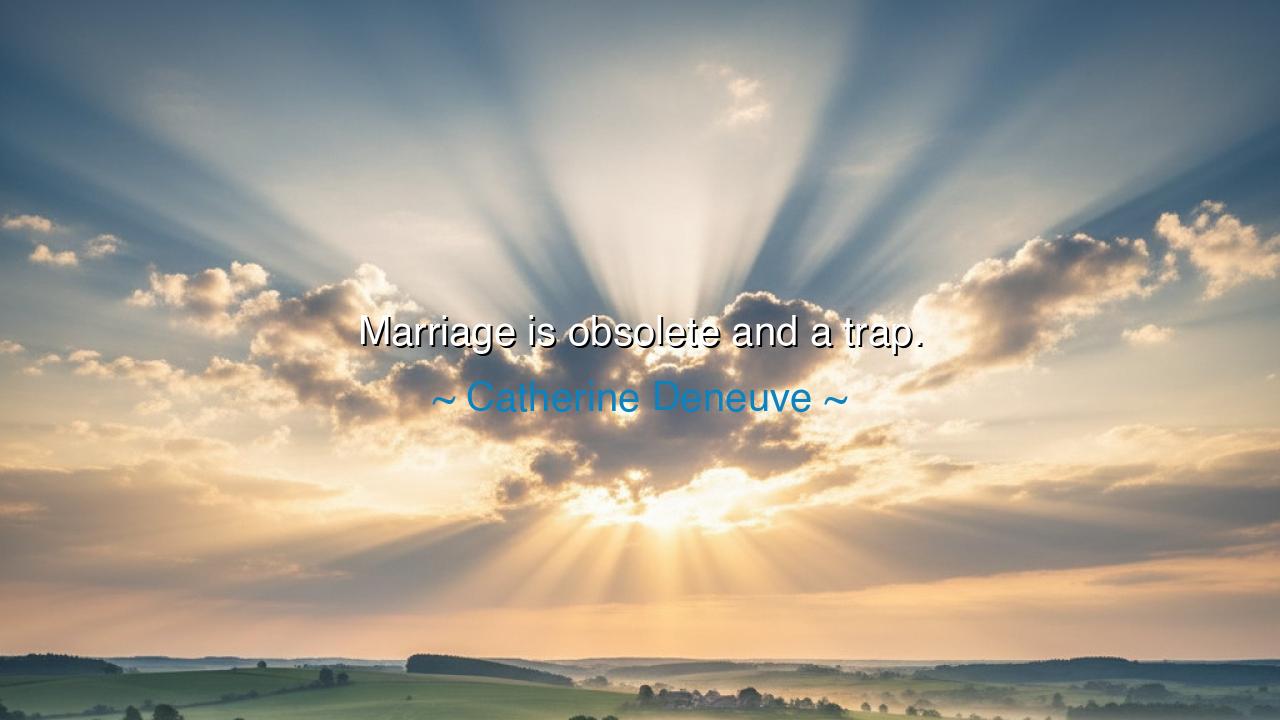
Marriage is obsolete and a trap.






When Catherine Deneuve declared, “Marriage is obsolete and a trap,” she spoke with the daring voice of one who had seen beyond the gilded illusions of tradition. Her words, sharp and unyielding, confront the centuries-old reverence for marriage as the pinnacle of human union. To call it obsolete is to say that its purpose has withered in a changing age; to call it a trap is to warn of its chains, which too often bind rather than free. Deneuve was not denying love, nor intimacy, but rather questioning the institution that has so often confined women within roles carved by others, not chosen by themselves.
The meaning of this quote is both rebellious and reflective. In saying marriage is obsolete, she challenges us to ask: has the institution kept pace with the freedom of the modern spirit? If once it secured lineage, inheritance, and protection, does it still serve those purposes in a world where women may shape their own destinies? And in calling it a trap, she shines light upon its darker history: where vows were chains, where duty outweighed desire, where individuality was sacrificed upon the altar of social expectation. For many, what was called union was, in truth, captivity.
The origin of Deneuve’s sentiment lies in her era and her life. A figure of French cinema, she came of age in a society wrestling with liberation, feminism, and the questioning of authority. In the 1960s and 70s, as the women’s movement swept through France and beyond, the call for independence clashed with the traditions of family and church. Deneuve herself, celebrated for her independence, embodied a generation unwilling to be trapped by roles written in advance. Thus her words were not only personal, but cultural—a declaration of freedom in an age unshackling itself from convention.
History offers us examples that illuminate her point. Consider Simone de Beauvoir, who with Jean-Paul Sartre chose love without marriage, refusing to enclose their bond in what she saw as a constraining institution. To them, marriage was indeed a trap, a contract that dulled passion and imposed roles. Their partnership, though unconventional, was an act of defiance, an attempt to preserve freedom within intimacy. Their lives show how rejecting the institution does not mean rejecting love, but seeking it on terms that honor autonomy.
Yet there is a deeper wisdom here, one that extends beyond rebellion. Deneuve’s words challenge us to see that institutions must evolve or perish. An institution that once safeguarded survival may, in another age, become a prison. To call marriage obsolete is not to say that love or commitment are obsolete, but to say that love cannot be confined in rigid structures that no longer serve human flourishing. It is a cry for authenticity—for unions based not on fear, pressure, or necessity, but on choice and equality.
The lesson is clear: do not enter marriage—or any bond—out of fear, expectation, or convention. Do not be caught in the trap of living another’s script. Instead, seek unions of truth, where freedom and devotion coexist, where love is chosen daily, not demanded by law or social pressure. Let your partnerships be alive, not bound by cages, but strengthened by shared will.
What, then, must the listener do? Examine the institutions of your age with courage. Ask whether they serve the spirit or suppress it. If you choose marriage, choose it with open eyes, shaping it not as a trap but as a sanctuary. If you refuse it, let your refusal be not bitterness, but authenticity. Above all, measure love not by the forms of tradition, but by the freedom it grants to both souls within it.
Remember always: marriage is obsolete and a trap—so it will be, if entered blindly, without reflection, without choice. But if entered with awareness, transformed to fit the needs of the living soul, it may yet be redeemed. Let Deneuve’s words remind us that no institution is sacred above the freedom of the human heart, and that the truest union is one where love itself is the law.






AAdministratorAdministrator
Welcome, honored guests. Please leave a comment, we will respond soon